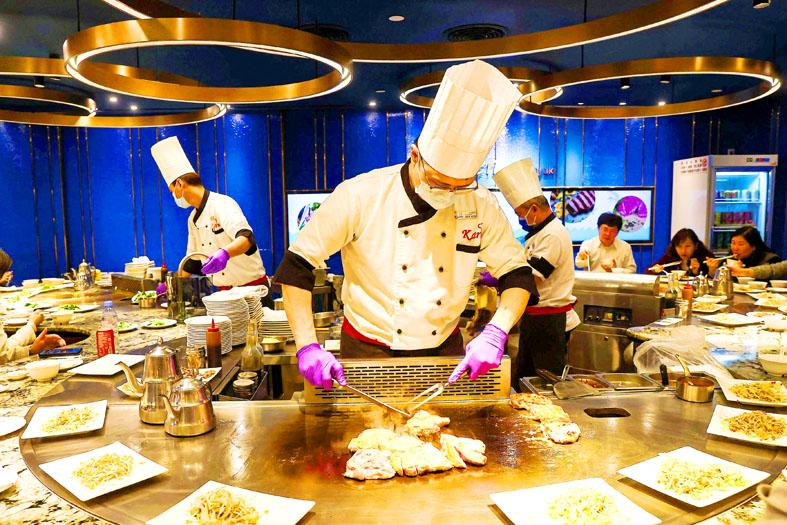The government’s business climate monitor remained “yellow-red” in January, suggesting the nation’s economy was still strong, although it slightly lost momentum, the National Development Council (NDC) said yesterday.
The total score of all constituent readings was 36, down 2 points from a month earlier, as the TAIEX and business confidence softened a bit, the council said.
The local bourse swung wildly in January amid heightened geopolitical tensions and unease over interest rate hikes by major global central banks, NDC research director Wu Ming-huei (吳明蕙) said.

Photo: Ann Wang, Reuters
The council uses a five-color system to depict the nation’s economic state, with “green” indicating steady growth, “red” suggesting a boom and “blue” signaling a recession. Dual colors indicate a shift to a stronger or weaker state.
The decline in points should not be seen as signaling an economic turnaround, because Taiwan’s economy has plateaued, Wu said.
Russia’s invasion of Ukraine has so far had little impact on Taiwan, as the nation has little trade with either country, Wu said, adding that the fallout would likely be limited to the financial sector, as global expectations of supply disruptions have boosted the prices of oil and grain.
Russia is a major producer of crude oil and grain.
Wu cited robust exports, a strong local currency and general pay hikes as evidence that Taiwan’s economy has held firm.
The index of leading indicators, which is used to predict the economic situation in the coming six months, shrank 0.06 percent from a month earlier to 102.08, the council said.
The sub-indices on export orders and payrolls in the industrial and service sectors increased, while the remaining measures all declined, it said.
The index of coincident indicators, which reflects the current economic state, expanded 0.32 percent to 103.16, as utility consumption picked up and wholesale, retail and restaurant revenues improved, it said.
In related news, the consumer confidence index last month shed 0.48 points to 73.19, a National Central University survey showed.
People became more confident about job hunting, the economic outlook and household income, tipping the sub-indices up to 65.3, 77.9 and 90 respectively, the university said.
However, they were less satisfied with consumer prices, stock investments and purchases of durable goods, driving the readings down to 30.45, 49.7 and 125.8 respectively, it said.
Confidence values of 100 or more indicate optimism, while values lower than the threshold suggest pessimism.
The university polled 2,813 people by telephone from Feb. 18 to 21.

JITTERS: Nexperia has a 20 percent market share for chips powering simpler features such as window controls, and changing supply chains could take years European carmakers are looking into ways to scratch components made with parts from China, spooked by deepening geopolitical spats playing out through chipmaker Nexperia BV and Beijing’s export controls on rare earths. To protect operations from trade ructions, several automakers are pushing major suppliers to find permanent alternatives to Chinese semiconductors, people familiar with the matter said. The industry is considering broader changes to its supply chain to adapt to shifting geopolitics, Europe’s main suppliers lobby CLEPA head Matthias Zink said. “We had some indications already — questions like: ‘How can you supply me without this dependency on China?’” Zink, who also

The number of Taiwanese working in the US rose to a record high of 137,000 last year, driven largely by Taiwan Semiconductor Manufacturing Co’s (TSMC, 台積電) rapid overseas expansion, according to government data released yesterday. A total of 666,000 Taiwanese nationals were employed abroad last year, an increase of 45,000 from 2023 and the highest level since the COVID-19 pandemic, data from the Directorate-General of Budget, Accounting and Statistics (DGBAS) showed. Overseas employment had steadily increased between 2009 and 2019, peaking at 739,000, before plunging to 319,000 in 2021 amid US-China trade tensions, global supply chain shifts, reshoring by Taiwanese companies and

Taiwan Semiconductor Manufacturing Co (TSMC, 台積電) received about NT$147 billion (US$4.71 billion) in subsidies from the US, Japanese, German and Chinese governments over the past two years for its global expansion. Financial data compiled by the world’s largest contract chipmaker showed the company secured NT$4.77 billion in subsidies from the governments in the third quarter, bringing the total for the first three quarters of the year to about NT$71.9 billion. Along with the NT$75.16 billion in financial aid TSMC received last year, the chipmaker obtained NT$147 billion in subsidies in almost two years, the data showed. The subsidies received by its subsidiaries —

At least US$50 million for the freedom of an Emirati sheikh: That is the king’s ransom paid two weeks ago to militants linked to al-Qaeda who are pushing to topple the Malian government and impose Islamic law. Alongside a crippling fuel blockade, the Group for the Support of Islam and Muslims (JNIM) has made kidnapping wealthy foreigners for a ransom a pillar of its strategy of “economic jihad.” Its goal: Oust the junta, which has struggled to contain Mali’s decade-long insurgency since taking power following back-to-back coups in 2020 and 2021, by scaring away investors and paralyzing the west African country’s economy.